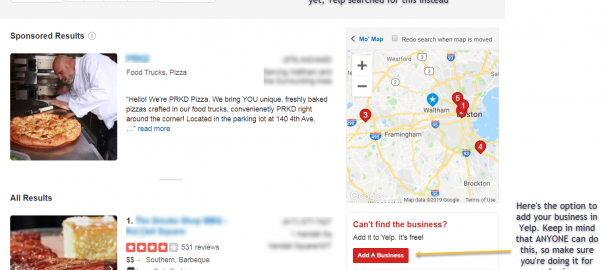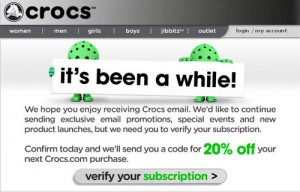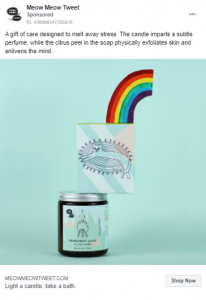
The internet has changed the way we do business — for both business owners and customers.
I turn to the internet for almost everything now — from food recommendations to basic home services, and even researching and purchasing new products.
And it’s not just me. The internet has become an indispensable resource for customers around the globe. Reviews, recommendations, suggestions, and online business listings help travelers and locals alike.
You can look up reviews for pretty much anything these days. And business listing sites like Yelp have all but replaced the phonebooks of the 19th and 20th Centuries.
Yelp is not only a directory, but it’s also a place where literally anyone can leave a review for any business, anywhere, at any time.
With approximately 155 million reviews on everything from acupuncturists to local zoos, it goes without saying that unclaimed Yelp business listings, or listings where the owners are not maximizing customer interactions, can lead to a loss of potential customers and business, and ultimately sales and profits.
What is Yelp?
Think of Yelp as the digital version of “word-of-mouth.” Customers turn to Yelp to find recommendations for businesses as well as what other real people think of those businesses. So, when your customers look to Yelp for information, they’re typically looking for:
- Businesses located in the area around them
- Individual reviews on various businesses and/or services
- Over-all ratings for a business
- Recommendations from others
All of these, together, can greatly influence customers’ buying decisions.
Still not quite sure what we mean? This should help:
Imagine you’re with a group of friends and you ask everyone to recommend the best place to get a new haircut. One says, “I’ve heard ABC Salon is great, but I’ve never been there myself.” Another person says, “I visited XYZ Salon last week and had the best experience. The service and quality were absolutely amazing, and I’m definitely going back.”
Based on the two recommendations, which salon are you more likely to try? I don’t know about you, but I would definitely book an appointment with the latter because I have some insight into the customer’s experience.
That’s basically how Yelp works.
Customers openly share their experiences and interactions with a given business, and their reviews and ratings become “word-of-mouth” recommendations. As a business owner, you can post high-quality images, add and update accurate and detailed information, and respond to reviews, all in order to further attract potential customers.
Why your business needs Yelp
You may be thinking, “I already have loyal customers and they always recommend us to their friends. Why do I need Yelp?”
You need Yelp because it can help you expand your opportunities, and therefore grow your business. With Yelp, you have the chance to grow beyond your current customer base and get noticed by new potential customers. A strong Yelp presence allows you to:
- Be found easily
- Attract potential customers
- Interact with previous customers
- Build on your brand identity
Step into your customers’ shoes for a moment to understand how Yelp helps your business to grow.
Imagine you’re in a new city, looking for restaurants that are local favorites. You type “best restaurants around me” on Google and a list of results show up, including Yelp listings. Then you go onto Yelp and find a five-star rated restaurant that looks like it’s within your budget. Digging deeper, you see where it’s located, the kind of food it offers, and browse through pictures posted by the restaurant and real customers to get a feel for what you can expect.
While reading some of the customer reviews (both positive and negative), you notice that the restaurant has taken the time to address, and answer, every review or query posted.
Wouldn’t that influence you to go and try the restaurant for yourself?
This is what your customers are considering too. You can influence their decisions by; being easy to find online, sharing all the necessary details about your business, showing that you care by engaging and interacting with your customers’ comments and reviews, and being sure to maintain your brand identity throughout.
Help! I’m on Yelp and I didn’t even know it!
Your business can exist on Yelp even if you don’t list it yourself!
Yes, it’s possible — even likely — that your business is already listed on Yelp. This could be damaging for your business because you’re not controlling the information that shows up.
But don’t worry, you have the option to claim your business and furnish your Yelp page with accurate information.
If your business is listed, but you haven’t claimed it yet, just click on your business name, and it will open up to a page like this:
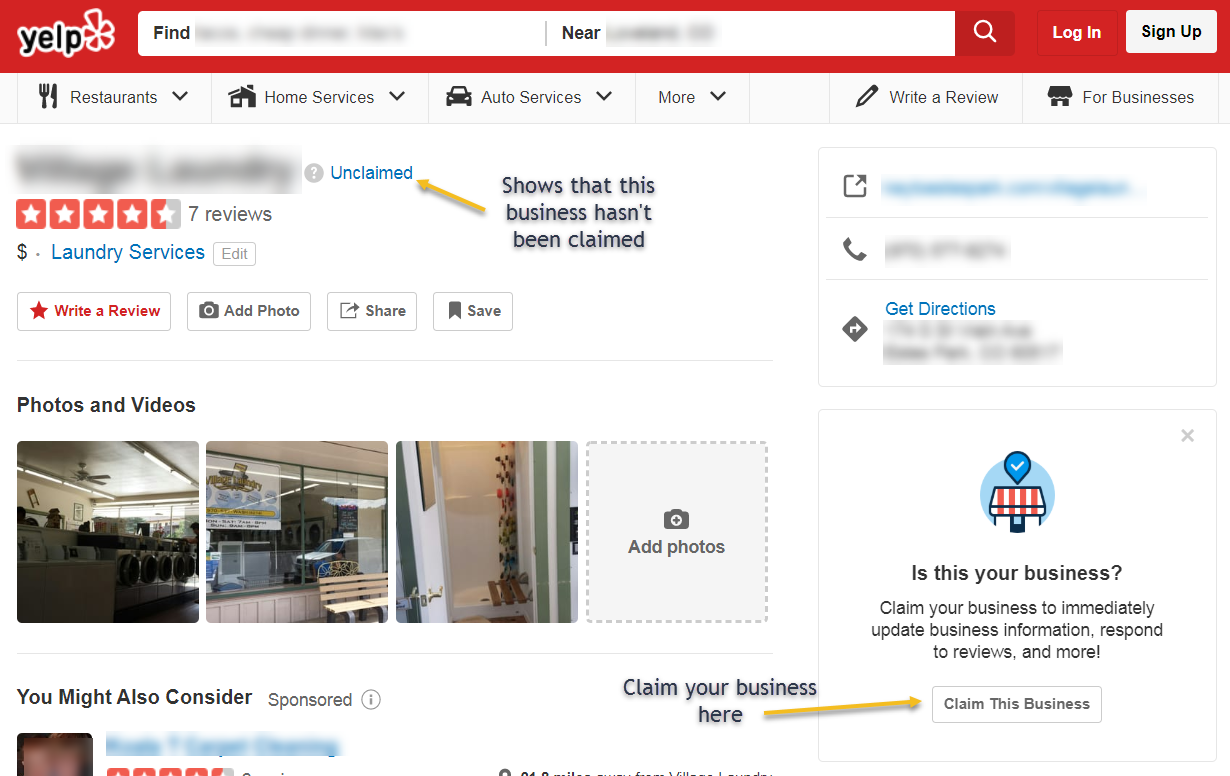
If you don’t claim your business, others can control what potential customers see.
Once you click on “Claim This Business”, you can both claim and fix the information about your business.
What if my business isn’t listed?
That’s okay too. Just go to Yelp, search for your business by name, and if it doesn’t show up, you can add your business to Yelp for free.
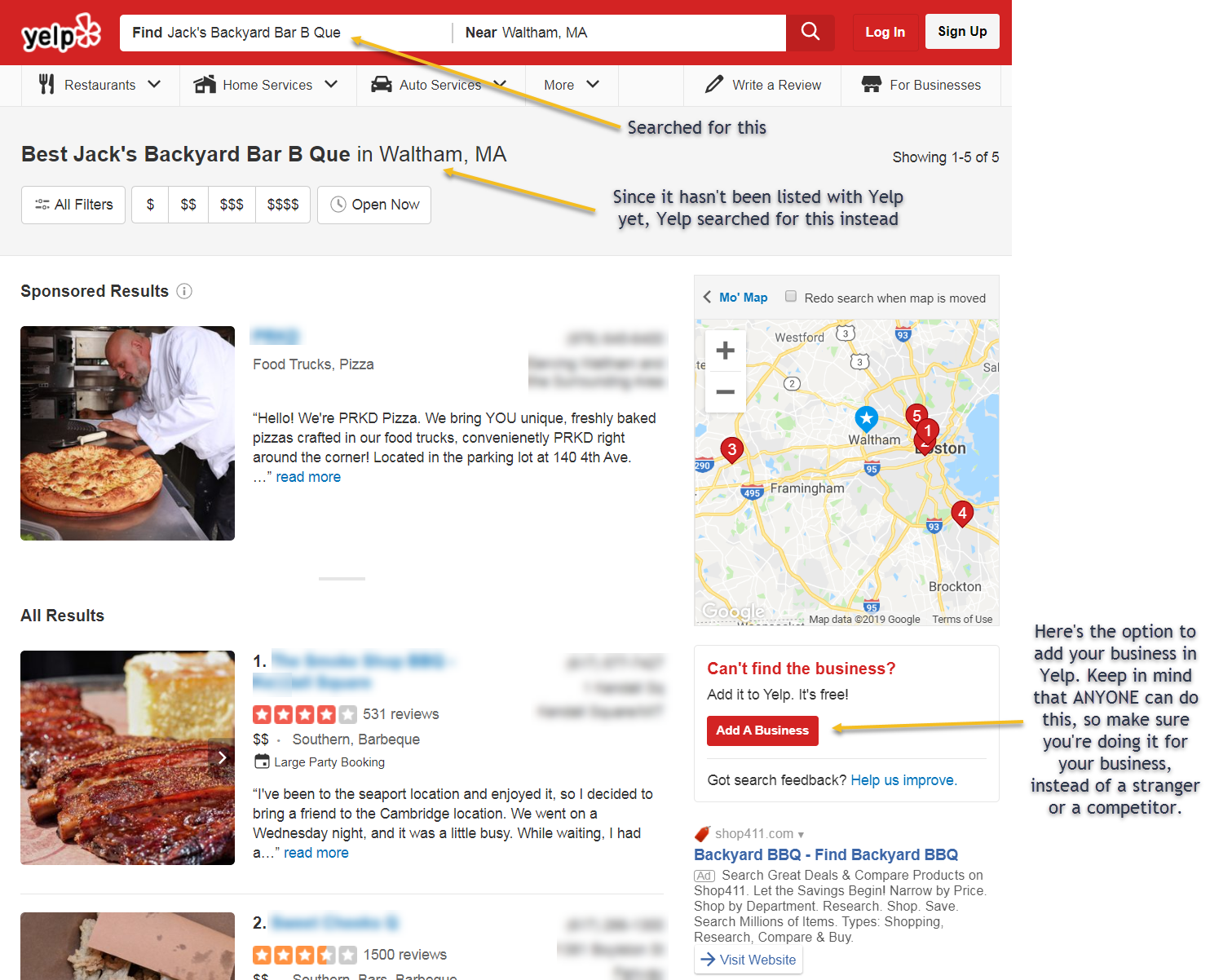 If your business isn’t listed yet, make sure and list it, as well as claim it.
If your business isn’t listed yet, make sure and list it, as well as claim it.
What to do after you’ve claimed your Yelp listing
Once you’ve claimed your listing and put in all the correct information about your business, there are certain things you’ll want to do on an ongoing and regular basis:
- Create Yelp Ads to be on top of the search results on Yelp. Just like Google Ads, promoting your business will always get you more visibility.
- Send out an email campaign to let your existing customer base know that you’re on Yelp and encourage them to share a review. However, you should never specifically ask for a good review, nor should you ever offer an incentive to a customer in exchange for a good, or positive, review. Providing a great experience is the best way to get great reviews.
- Encourage people to check-in to your business on the Yelp app when they’re visiting. This will bump your visibility.
- Check your Yelp page every day to ensure you never miss out on a chance to engage and interact with customers. Respond to reviews — both good and bad — to show your customers that you value their feedback.
- Keep your Yelp page updated. Add information about new offers, events, or changes to your offerings to get the most from your Yelp business page.
How should I handle reviews?
It’s important that you respond to all of your reviews and queries in a timely manner.
When someone leaves you a positive review, make sure to thank them for being a customer and make a recommendation for their next visit (whether it’s a menu item, new service, or item they might be interested in), but don’t make a pitch for another sale. Keep it light, casual, and friendly, and be sure to stay it inline with your brand’s identity and personality.
Addressing negative reviews and offering a solution, whenever possible, is as important as thanking customers for a positive review. Customers who may have had a bad experience or who are dissatisfied with your services must know that you are willing to make it better for them. This also helps potential customers know that you value customer feedback and are willing to make the effort to ensure a positive experience for all your customers.
Keep in mind that negative reviews are really positive feedback that you can use in order to improve your services or product, and to grow further and improve. And if you respond appropriately, you can use reviews to build relationships. After all, isn’t that what running a small business is all about?
Grow with Yelp
Customers today turn to online search results to find various businesses, and to make educated buying decisions. Accurate information, great reviews, and an updated Yelp page helps customers imagine the experience they can expect upon doing business with you.
Yelp allows you to get noticed by potential customers, build a strong brand identity, interact and engage with customers, and grow your business.
If you still haven’t claimed your business on Yelp, claim it now, and update it with the information your customers are looking for.
Digital & Social Articles on Business 2 Community
(79)
Report Post